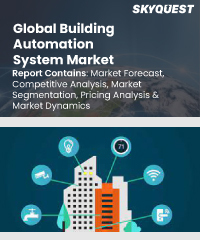
Product ID: SQMIG20B2052

Report ID:
SQMIG20B2052 |
Region:
Global |
Published Date: April, 2024
Pages:
202
|
Tables:
61 |
Figures:
75
Global Building Automation System Market size was valued at USD 83.61 billion in 2022 and is poised to grow from USD 92.22 billion in 2023 to USD 202.04 billion by 2031, growing at a CAGR of 10.3% in the forecast period (2024-2031).
A Building Automation System (BAS), also known as a Building Control System or Building Management System, is a system that controls many electrical, electronic, and mechanical systems in a building. Market Report tracks revenues that companies accumulate through leases function in the form of functional solutions sold outside the world.
Areas such as building control systems, lighting controls, fire detection, HVAC systems, and security systems are included in the analysis and extend to end-users such as residential and commercial. The global market for building systems automation is driven by the increasing popularity of the Internet of Things and rising security concerns.
According to Cisco's annual Internet report, there will be about 30 billion devices and network connections next year, from 18.4 billion in 2018 to 33% in 2023 (6.1 billion) in 2018, by comparison.
According to the U.S. According to the Department of Energy, buildings, and the U.S. are the single largest consumer of energy in the economy. They account for about 75% of the country’s electricity consumption and 40% of the total energy demand.
The International Energy Agency says all new buildings and 20% of existing buildings will have to be carbon-free as early as 2030 to meet the global zero-carbon target. According to a report published in the Proceedings of the National Academy of Sciences, an estimated 30% of the world’s population is expected to live in areas where the average temperature will exceed 29°C over the next 50 years due to rapid warming associated with climate change Rise and population expansion.
Currently, this atmosphere is present in 1% of the Earth’s surface, especially in the hottest parts of the Sahara Desert. But by 2070, this warming is expected to cover more than a fifth of the planet’s surface.
With advancing technologies, smart buildings are becoming increasingly complex, requiring rapid documentation through retro-commissioning. In addition, the risks associated with maintaining operational integrity are also increasing. Therefore, the demand for complete construction automation is expected to increase.
It is important to establish significant communication between the system provider/developer and the building owner to understand the function of the building.
Our industry expert will work with you to provide you with customized data in a short amount of time.
REQUEST FREE CUSTOMIZATIONWant to customize this report? This report can be personalized according to your needs. Our analysts and industry experts will work directly with you to understand your requirements and provide you with customized data in a short amount of time. We offer $1000 worth of FREE customization at the time of purchase.

Product ID: SQMIG20B2052